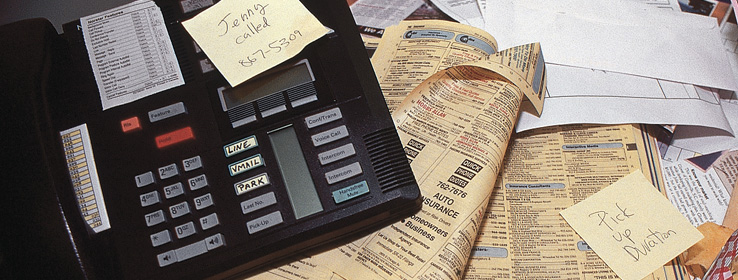Is your work all-consuming? Does your spouse complain that you're never home? Do worries about your bottom line or your current paint jobs keep you up at night?
If so, you may not be able to leave work at work. And you're not alone.
Americans take less vacation time, work longer days and retire later than workers in any other industrialized nation. According to a recent Bureau of Labor Statistics report, more than 25 million Americans - more than 20 percent of the total work force - say that they work at least 49 hours a week. Eleven million worked more than 59 hours a week. In addition, technology is blurring the line between work and home lives. Cell phones, pagers and laptop computers make it possible to work anytime, anywhere.
"Workaholism is probably the only socially-approved addiction," says Dan G., co-founder of Workaholics Anonymous. "It's part of our work ethic. You could be painting day and night, and spend all your spare time out there getting bids, and no one would question your priorities."
No one, that is, except your family and friends. "There's a difference between working hard and being a workaholic," Dan G. says. "Problems arise when work becomes the central focus of life to the exclusion of family, friends and social life."
If you feel you have reached that point (try taking the 20-point inventory below), here are some suggestions from Workaholics Anonymous on how to restore the balance between your work and life.
PRIORITIZE. Decide what is most important in your life. Set priorities for tasks you want to accomplish, while remaining flexible to changing circumstances. View interruptions and accidents as opportunities for growth.
SUBSTITUTE. Don't add a new activity or task without eliminating another that demands equal time and energy.
UNDERSCHEDULE. Allow more time than you think you need for a task or trip. This gives you a comfortable margin to accommodate the unexpected.
CONCENTRATE. Try to do one thing at a time.
RELAX. When you feel tension, you become disconnected from others. Try to be alert to the people and situations that trigger pressure in your life. Pay attention to the signals your body sends you, and don't yield to unnecessary outside pressure or create pressure for others.
PACE YOURSELF. Work at a comfortable pace, and rest before you get tired. If you don't get "wound up" at work, you won't need to unwind.
ACCEPT. Impatience and rushing accomplish nothing but creating stress for you and those around you. Accept the outcomes of your endeavors, whatever the result or timing.
ASK. Admit your weaknesses and mistakes, and ask others for help when you need it.
BALANCE. Balance your involvement with work with efforts to develop your personal relationships, spiritual growth, creativity and playful attitude. Instead of working non-stop, schedule some time for play. And don't make play into a work project.
LIVE IN THE NOW. Try to live each moment with serenity, joy and gratitude.
How Do I Know If I'm a Workaholic?
Do you get more excited about your work than about family or anything else?
Are there times when you can charge through your work and other times when you can't?
Do you take work with you to bed? on weekends? on vacation?
Is work the activity you like to do best and talk about most?
Do you work more than 40 hours a week?
Do you turn your hobbies into moneymaking ventures?
Do you take complete responsibility for the outcome of your work efforts?
Have your family or friends given up expecting you on time?
Do you take on extra work because you are concerned that it won't otherwise get done?
Do you underestimate how long a project will take and then rush to complete it?
Do you believe that it is okay to work long hours if you love what you are doing?
Do you get impatient with people who have other priorities besides work?
Are you afraid that if you don't work hard you will lose your job or be a failure?
Is the future a constant worry for you even when things are going very well?
Do you do things energetically and competitively including play?
Do you get irritated when people ask something else?
Have your long hours hurt your family or other relationships?
Do you think about your work while driving, falling asleep or when others are talking?
Do you work or read during meals?
Do you believe that more money will solve the other problems in your life?
If you answered yes to three or more questions, there is a chance you are a workaholic or on your way to becoming one.
Reprinted permission of Workaholics Anonymous.
For more information, visit Workaholics Anonymous.









